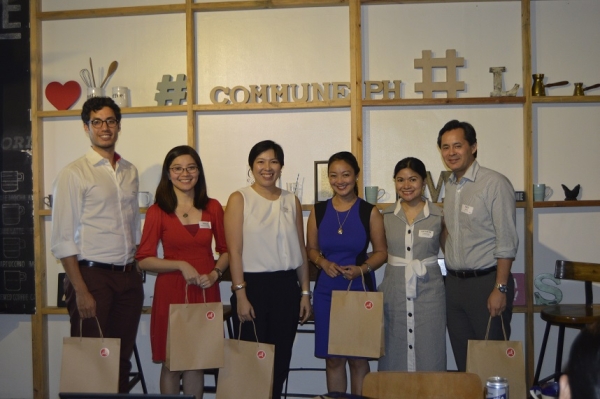Asia 21 Leaders Working Towards Competency and Employability
Manila, May 24, 2016 - Asia Society Philippines in partnership with APEC Schools recently featured Asia 21 Young Leaders who are at the forefront of the education sector in the Philippines as the 2nd installment of Asia 21 Conversations series entitled, Shaping Tomorrow’s Leaders and Rockstars: Is Our Education System Ready at Commune Café.
Speakers were Asia 21 Young Leaders Natalie Jorge, Executive Director, Bato-Balani Foundation; Trissa Manalastas-Menardo, Director for Finance, Department of Education; Henry Motte-Munoz, Founder, Edukasyon.ph; Solvie Nubla-Lee, Director, Pathways to Higher Education; with special participation by Alfredo I. Ayala, Chief Executive Officer, LiveIt Investments, Ltd. and Ayala Education, Inc., and Managing Director, Member of Management Committee, Ayala Corporation.
Moderated by Jorge, panelists discussed the different challenges and issues in the education system in the Philippines, the current action-steps being taken, and how the private sector is helping fill the gaps in raising the quality and affordability of the educational system.
Among the key points are the following:
- The transition to K-12 is a positive change. Manalastas-Menardo from the Department of Education explained the government’s initiatives and efforts to improve the quality and standard of education in the Philippines. Since the Philippines is the only country left in Southeast Asia that is not up to par with global standards, she stressed that the “K-12 is the biggest educational reform of the government” and one that would be very beneficial in the long-term, despite the arduous process it entails during the transition. Ultimately the goal of the K-12 reform is to decongest and enhance the curriculum, and hopefully lessen drop-out rates. Senior high-school will be specialized through four tracks for students to identify the career goals they are interested in prior to college.
- The objective of mass education is employability. During the discussion, Ayala highlighted that the “global demand for Filipino talent is enormous”. He said that the problem for employers is the unmet demand of the talent they want. From the perspective of parents, it is the unmet demand for quality yet affordable education that will produce good opportunities. As such, APEC Schools is focused on providing quality education at an affordable price, by investing money on the curriculum and teachers, as opposed to infrastructure building, to keep the costs down.
However, there are still issue areas that need to be addressed. Among them are:
- There is a huge gap in teacher competency. There needs to be better eligibility requirements and training programs to enable teachers to teach global skills, and likewise equip themselves with the much-needed 21st century skills.
- Private schools are largely unsupervised and unaudited. The focus of the Department of Education has always been to provide accessible education to the less-privileged. Hence, the quality of curriculum and educational material are sometimes subpar. As one participant (Anna Meloto-Wilk, President and Co-Founder, Human Heart Nature) noted, “this is one area where parents and the private sector can step-in to provide more support to DepEd”.
Despite these gaps it is important to note that overall, the Philippines have empathic and competent citizens both in the private and public sectors who are doing their best to address these challenges. Partnership with the public and private sectors will provide more opportunities. Motte-Munoz who hails from the private-sector, believes that “every student, regardless of their background or socio-economic group deserves education that is high-quality and affordable.” Thus he founded Edukasyon.ph which is the biggest scholarship database in the Philippines with about 4,000 entries on their website. Edukasyon.ph aims to address the skills mismatch by providing students the opportunities to get the right education for the careers they aspire for.
Nubla-Lee meanwhile, is focused on finding the brightest talents from the under-privileged. “Pathways’ mission is to identify talented students from the public schools and to nurture them into the next generation leaders from the grassroots level.” She has also partnered up with Jorge of Bato-Balani Foundation to expose students to business and entrepreneurship. Nubla-Lee believes that the diversity of the next generation leaders will be good for the Philippines.
The event which was at full-capacity, was proceeded by a networking session. While featuring the beats of Commune Café’s resident DJs, the speakers continued the discussion and engaged their peers and guests who are professionals in the education space, after-school initiatives, educational foundations, ed-tech start-ups, students, and parents.
Shaping Tomorrow’s Leaders and Rockstars: Is Our Education System Ready is part of a series of casual dialogues called ‘Asia 21 Conversations’ by Asia 21 Young Leaders of Asia Society, that aims to highlight the advocacies of the Asia 21 alumni, and provide a platform for professionals from different sectors to work together and find solutions to address challenges. The Asia 21 Young Leaders Initiative is an active network of leaders from the Asia Pacific (under the age of 40 years old at the time of selection) that seeks to promote mutual understanding and effective collaborations to address shared challenges in Asia. To learn more, please visit AsiaSociety.org/Asia21.
